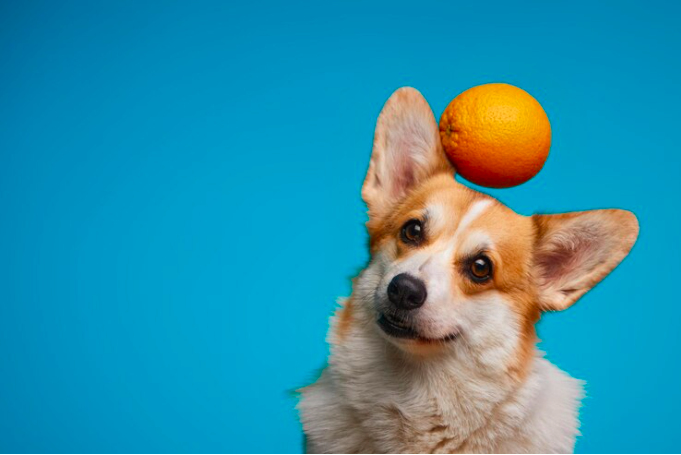When it comes to our furry friends, we often wonder which foods are safe for them. Dogs have different nutritional needs than humans, so it’s important to be careful about what we give them to eat. One common question dog owners ask is, “Can dogs eat mandarins?”
In this article, we will find out if it’s safe for dogs to eat mandarins and what precautions we should take to keep them healthy.
Are Mandarins Safe for Dogs?

Mandarins, also known as tangerines or citrus reticulata, are small citrus fruits that many people enjoy. They are rich in vitamins and minerals, making them a healthy snack for us. But what about our furry companions? Can they have mandarins too?
Yes, dogs can eat mandarins, but it’s important to give them in moderation and follow some precautions. Mandarins are not toxic to dogs, so eating a small amount won’t harm them. However, there are a few things we need to keep in mind before sharing this fruit with our dogs.
Can Dogs Eat Mandarins?
Yes, dogs can eat mandarins in small amounts. Mandarins are not toxic to dogs and can provide some vitamins and nutrients. However, due to their high sugar content and acidity, they should be given sparingly.
Remove any seeds and peel before feeding, as these can pose choking hazards or cause digestive issues. Always introduce new foods gradually and observe your dog for any adverse reactions. If in doubt, consult your veterinarian.
The Benefits of Mandarins for Dogs

Mandarins can provide some nutritional benefits to dogs when given in moderation. Here are a few advantages:
Vitamin C Boost
Mandarins are packed with vitamin C, which can help support a dog’s immune system. Although dogs produce their own vitamin C, a small amount from mandarins can still be beneficial to their overall health.
Fiber Content
Mandarins contain dietary fiber, which aids in digestion and helps regulate bowel movements in dogs. But remember, too much fiber can lead to an upset stomach or loose stools. Moderation is key!
Hydration
Mandarins have high water content, which can help keep dogs hydrated. This is especially useful during hot summer months or if a dog doesn’t drink enough water throughout the day.
Precautions When Feeding Mandarins to Dogs

While mandarins can have health benefits for dogs, it’s important to take certain precautions to ensure their safety. Here are some important guidelines to follow:
Remove the Peel
Before giving mandarins to a dog, always remove the peel completely. The peel can be hard to digest and may contain harmful substances like pesticides. So, it’s best to avoid it.
Avoid Seeds
Mandarins usually have seeds, which can be a choking hazard or cause digestive problems for dogs. Make sure to remove all the seeds before giving mandarins to your furry friend.
Moderation is Key
Although mandarins can be a healthy treat, they should only be given to dogs in moderation. Too much citrus fruit can upset their stomach, cause diarrhea, or other digestive issues. As a general rule, treats should make up no more than 10% of a dog’s daily calorie intake.
Signs of Adverse Reactions

Even when we follow the precautions mentioned above, some dogs may still have adverse reactions to mandarins. It’s important to watch out for any signs of discomfort or allergic reactions. If we notice any of the following symptoms, it’s best to consult with a veterinarian:
Upset Stomach
Keep an eye out for signs of gastrointestinal distress like vomiting, diarrhea, or excessive gas.
Allergic Reactions
Some dogs may be allergic to citrus fruits, including mandarins. Allergic reactions can manifest as itching, redness, hives, or swelling, especially around the face or mouth. If we see these symptoms, we should stop giving mandarins immediately.
Introducing Mandarins to a Dog’s Diet First Time
If we’re introducing mandarins to a dog’s diet for the first time, it’s important to do so gradually. Start by offering a small piece of mandarin as a treat and observe the dog’s reaction.
Watch for any signs of digestive upset or allergic reactions. If the dog tolerates the fruit well, we can slowly increase the portion size over time.
Remember, moderation is key, and mandarins should only be a small part of a dog’s overall diet.
Other Factors to Consider
While mandarins themselves may be safe for dogs to eat in moderation, there are other factors to consider. For example, some mandarins may be treated with pesticides or other chemicals. It’s best to choose organic mandarins or wash the fruit thoroughly before giving it to a dog.
Additionally, if a dog has any underlying health conditions or is on a specific diet, it’s always wise to consult with a veterinarian before introducing any new foods, including mandarins.
FAQs about Dogs and Mandarins
Q: Can dogs eat mandarin oranges?
Yes, dogs can eat mandarin oranges, but it should be in moderation and without the peel or seeds.
Q: Are mandarin peels safe for dogs?
No, mandarin peels are not safe for dogs. They are difficult to digest and may cause gastrointestinal problems.
Q: What should I do if my dog eats mandarin peels or seeds?
If your dog accidentally consumes mandarin peels or seeds, monitor them closely. If any symptoms of distress occur or if your dog starts choking, seek veterinary assistance immediately.
Q: Can mandarins be a healthy treat for dogs?
A: While mandarins contain vitamins, they also have a high sugar content. It’s best to consult with your veterinarian to determine what treats are suitable for your dog’s specific dietary needs.
Q: Are there any alternative fruits that are safer for dogs to eat?
A: Yes, there are many fruits that are safe and healthy for dogs, such as apples, bananas, and blueberries. However, always remember to introduce new foods gradually and in moderation.
Conclusion
In conclusion, dogs can eat mandarins, but we should be cautious and give them in moderation. Mandarins can provide some nutritional benefits to dogs, such as a boost of vitamin C and hydration.
However, we should always remove the peel and seeds, and be aware of any signs of adverse reactions. If we have any concerns or questions, it’s best to consult with a veterinarian.
Remember, the health and well-being of our furry friends should always be our top priority.

